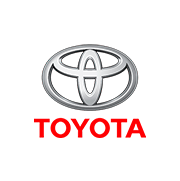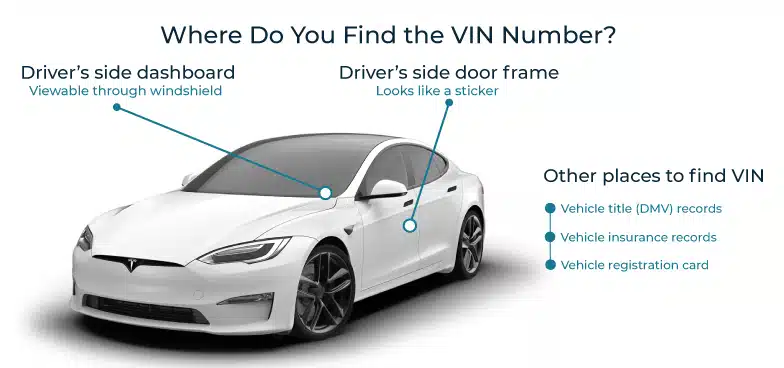Tutto sui numeri di telaio spiegati in termini semplici
Guida alla ricerca del numero di telaio e al controllo dell'auto
Quando si tratta di acquistare, vendere o possedere un'auto, esiste un codice univoco che può essere utilizzato per accedere a ogni singolo dettaglio di qualsiasi veicolo, chiamato VIN o Vehicle Identification Number.
Si tratta di un identificativo unico assegnato a ogni auto dal produttore. Con il VIN è possibile ottenere informazioni precise e prendere le giuste decisioni nel mercato delle auto usate.
In questa guida completa parleremo in modo esaustivo dei numeri di telaio delle auto, esplorando il loro significato, i preziosi dettagli a cui è possibile accedere attraverso i loro caratteri e tutto ciò che è necessario sapere sui numeri di telaio.
Iniziamo la nostra guida con le nozioni di base: Che cos'è esattamente il numero di telaio e dove si trova sul vostro veicolo?
Indice dei contenuti
- Storia dei numeri di telaio: Cos'è un numero di identificazione del veicolo?
- Origine e standardizzazione dei numeri VIN
- Classico VS. moderno Numeri di telaio moderni
- Decifrare i caratteri del VIN: Come leggere i numeri VIN
- Ripartizione dei 17 caratteri di un VIN: cosa significa ogni cifra di un VIN?
- Come i numeri VIN svolgono un ruolo importante nell'identificazione dei veicoli
- Alternativa Carfax: come vengono utilizzati i numeri di telaio delle auto per cercare la storia di un veicolo
- Carfax vs. Storia dettagliata del veicolo: La migliore alternativa a Carfax
- Importanza dei numeri di telaio nell'acquisto di auto usate
- Paesi in cui si utilizzano i numeri VIN
- Numeri di telaio per motocicli e ATV
- Numeri VIN per i veicoli ricreazionali (RV)
- Numeri di telaio per camion e semirimorchi
- Strumenti e risorse per la decodifica dei VIN
- Adesivi per finestre e schede di costruzione
- Domande frequenti
Storia dei numeri di telaio: Cos'è un numero di identificazione del veicolo?
Il VIN, o numero di identificazione del veicolo, è l'impronta digitale unica di un'auto e contiene tutti i dettagli sulla sua origine, l'anno, la marca, il modello e la storia.
Composto in genere da 17 caratteri, o da 5 a 13 cifre per le auto d'epoca, ogni carattere riporta dettagli specifici sul veicolo, come il produttore, il modello, il tipo di motore e l'anno di produzione.
Il VIN di solito non contiene le lettere Q (q), I (i) e O (o), per evitare di confonderlo con le cifre 0 e 1.
Dove si trova il VIN?
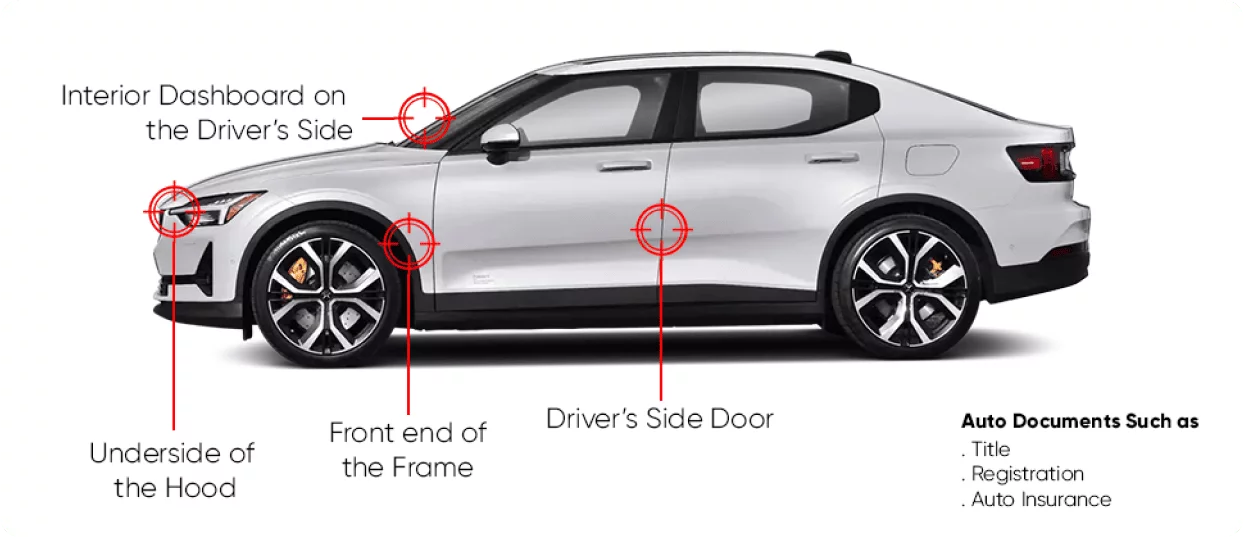
Origine e standardizzazione dei numeri VIN
Il concetto di VIN risale ai primi anni '50, quando le case automobilistiche riconobbero la necessità di un sistema di identificazione standardizzato.
Immaginate di produrre migliaia di veicoli senza poterli identificare o tracciare. Si trattava di un sistema non organizzato che doveva essere migliorato e per questo sono stati introdotti i numeri di telaio. Inizialmente, il loro formato e la loro lunghezza variavano notevolmente, creando confusione e ostacolando gli sforzi per rintracciare e richiamare i veicoli.
Con l'aumentare delle preoccupazioni in materia di sicurezza e di normative, l'industria automobilistica ha avvertito la necessità di un approccio unificato. Questo ha portato alla standardizzazione dei VIN nel 1981 da parte di l'Amministrazione nazionale per la sicurezza del traffico autostradale (NHTSA)con un formato e una struttura prestabiliti che rimangono tuttora in vigore.
Questo approccio sistematico ha garantito la coerenza tra tutti i veicoli, facilitando alle autorità, ai produttori e ai consumatori l'interpretazione e l'utilizzo delle informazioni codificate in queste stringhe alfanumeriche.
Queste modifiche sono state applicate a tutti i veicoli prodotti durante e dopo il 1981, ma i numeri di telaio delle auto più vecchie sono ancora validi.
Classico VS. moderno Numeri di telaio moderni
Numeri di telaio classici
Prima della standardizzazione del numero di identificazione del veicolo, i produttori erano liberi di assegnare numeri di identificazione ai loro veicoli con formati diversi. Questo ha fatto sì che i numeri di telaio classici avessero per lo più tra le 5 e le 13 cifre e mancassero della coerenza globale che vediamo oggi. Un esempio di numero VIN classico è:
6432193670
Ecco alcune caratteristiche dei VIN classici:
- Lunghezza e formato: I numeri di telaio classici sono spesso più corti, da 5 a 13 caratteri. Il formato varia da un produttore all'altro, con conseguenti incongruenze nell'identificazione.
- Standardizzazione limitata: Prima degli anni '80, i numeri di telaio non erano uniformi tra i vari produttori o regioni. La mancanza di standardizzazione rendeva difficile la decodifica del VIN di un veicolo.
- Copertura informativa: I numeri di telaio classici si concentravano principalmente sull'identificazione di base, come il produttore, il modello e la sequenza di produzione. Mancano i dettagli completi che si trovano nei VIN moderni.
Numeri di telaio moderni
Il moderno sistema VIN a 17 caratteri, istituito all'inizio degli anni '80, ha apportato notevoli miglioramenti alla standardizzazione e alla trasmissione delle informazioni. Un esempio di VIN moderno è:
Ecco le caratteristiche principali dei moderni VIN:
- Lunghezza e struttura uniformi: I VIN moderni hanno una lunghezza standardizzata di 17 caratteri, organizzati in segmenti specifici. In questo modo il VIN è più facile da identificare.
- Standardizzazione globale: Il moderno sistema VIN è riconosciuto a livello internazionale e utilizzato da tutti i principali produttori di veicoli. Ciò facilita l'identificazione dei veicoli, la tracciabilità dei richiami e altre funzioni cruciali su scala globale.
- Informazioni complete: I moderni numeri di telaio contengono una grande quantità di informazioni, tra cui il produttore e gli attributi del veicolo, e possono essere utilizzati per accedere alla storia e ai registri del veicolo, come i registri di proprietà, la storia delle aste e delle vendite, i registri dei furti e altro ancora.
Decifrare i caratteri del VIN: Come leggere i numeri VIN
Il VIN non è una semplice combinazione di caratteri, come abbiamo visto nella sezione precedente, ma segue un formato strutturato che fornisce dettagli specifici sul veicolo ed è raggruppato in segmenti. Questi segmenti sono:
- Identificatore mondiale del produttore (WMI - primi 3 caratteri): Questi caratteri iniziali indicano il Paese di origine e il costruttore del veicolo.
- Sezione descrittiva del veicolo (VDS dalla quarta alla nona posizione): Questi caratteri forniscono informazioni su marca, modello, tipo di motore e altro ancora. È come il codice genetico di un veicolo specifico, che ne descrive le caratteristiche. In questa sezione è possibile trovare anche la cifra di controllo.
- Sezione identificativo del veicolo (VIS - cifre dalla decima alla diciassettesima): Questa sezione contiene dettagli fondamentali come l'anno del modello, il codice dello stabilimento di produzione e un numero sequenziale unico per ogni veicolo.
Il VIN è una stringa di caratteri e numeri che può essere utilizzata per accedere a ogni singolo dettaglio di un veicolo se si comprende il significato di ogni carattere.
Diamo un'occhiata più da vicino alla ripartizione completa di un VIN a 17 personaggi e alle informazioni che ogni personaggio contiene.
Ripartizione dei 17 caratteri di un VIN: cosa significa ogni cifra di un VIN?

Primo personaggio
Questo carattere indica il Paese di origine. Ad esempio, le auto con VIN che iniziano con 1, 4 e 5 sono prodotte negli Stati Uniti. Ecco alcuni codici del Paese di origine:
| Carattere | Regione | Paese |
|---|---|---|
| A-H | Africa | AA-AH = Sudafrica |
| J-R | Asia | >J = Giappone/ KL-KR = Corea del Sud L = Cina MA-ME = India MF-MK = Indonesia ML-MR = Thailandia MS = Myanmar PA-PE = Filippine PL-PR = Malesia RF-RG = Taiwan |
| S-Z | Europa | SA-SM = Regno Unito SN-ST, W = Germania SU-SZ = Polonia TA-TH = Svizzera TJ-TP = Repubblica Ceca TR-TV = Ungheria TW = Portogallo VA-VE = Austria VF-VR = Francia VS-VW = Spagna VX-V2 = Jugoslavia XL-XM = Paesi Bassi XS-XW = URSS X3-X0 = Russia YA-YE = Belgio YF-YK = Finlandia YS-YW = Svezia ZA-ZR = Italia |
| 1-5 | Nord America | 1, 4, 5 = Stati Uniti 2 = Canada 3 = Messico |
| 6-7 | Oceania | 6A-6W = Australia 7A-7E = Nuova Zelanda |
| 8-0 | Sud America | 8A-8E = Argentina 8F-8J = Cile 8X-82 = Venezuela 9A-9E, 93-99 = Brasile 9F-9J = Colombia |
Secondo carattere Questo carattere, in continuità con il primo, specifica il produttore in modo più dettagliato. Ad esempio, "G" sta per General Motors, "C" può essere Chrysler e "B" per BMW.
Terzo personaggio
Il terzo carattere codifica il tipo o la divisione del veicolo. Quindi, in combinazione con i primi due caratteri, è possibile sapere se il veicolo è un camion, una berlina, un SUV, una motocicletta o qualsiasi altro tipo di veicolo.
Quarto personaggio
Questo carattere rappresenta il tipo di carrozzeria generale. Ad esempio, "C" potrebbe indicare un'autovettura.
Quinto personaggio
Questo carattere definisce ulteriormente gli attributi del veicolo fornendo informazioni sul motore.
Sesto personaggio
Il sesto carattere indica il tipo di motore installato nel veicolo.
Settimo personaggio
Il settimo carattere è un codice che rappresenta il sistema di ritenuta installato nel veicolo. Poiché i motocicli non hanno un sistema di ritenuta, il settimo carattere fornisce ulteriori informazioni sul motore.
Ottavo personaggio
Questo carattere rivela il modello del veicolo.
Nono personaggio
La cifra di controllo viene calcolata utilizzando un algoritmo specifico, sviluppato dal Dipartimento dei Trasporti degli Stati Uniti, applicato ai caratteri precedenti. Serve a verificare rapidamente l'accuratezza dell'intero VIN.
Decimo personaggio
Questo carattere indica l'anno di modello del veicolo. "V" indica un veicolo dell'anno di modello 1997. Ecco alcuni codici degli anni:
Codice/Anno
- L 1990
- M 1991
- N 1992
- P 1993
- R 1994
- S 1995
- T 1996
- V 1997
- W 1998
- X 1999
Codice/Anno
- Y 2000
- 1 2001
- 2 2002
- 3 2003
- 4 2004
- 5 2005
- 6 2006
- 7 2007
- 8 2008
- 9 2009
Codice/Anno
- A 2010
- B 2011
- C 2012
- D 2013
- E 2014
- F 2015
- G 2016
- H 2017
- J 2018
- K 2019
Codice/Anno
- L 2020
- M 2021
- N 2022
- P 2023
- R 2024
- S 2025
- T 2026
- V 2027
- W 2028
- X 2029
Codice/Anno
- Y 2030
- 1 2031
- 2 2032
- 3 2033
- 4 2034
- 5 2035
- 6 2036
- 7 2037
- 8 2038
- 9 2039
Undicesimo personaggio
Questo carattere identifica lo stabilimento di produzione in cui il veicolo è stato assemblato.
Personaggi dal dodicesimo al diciassettesimo
Questi caratteri forniscono un numero sequenziale unico per il veicolo, distinguendolo da altri prodotti nello stesso stabilimento. Essi fungono da numero di serie del veicolo.
Vale la pena ricordare che per numeri di telaio delle motoI caratteri da quattro a otto possono codificare informazioni leggermente diverse rispetto ai numeri di telaio delle auto. Questo perché le informazioni fornite variano a seconda dei produttori, ma contengono dettagli sulle dimensioni del motore, sul tipo di motore e persino sul modello.
Comprendendo il significato di ogni personaggio, si può capire l'identità del veicolo e si può fare riferimento a questa guida in qualsiasi momento.
Come i numeri VIN svolgono un ruolo importante nell'identificazione dei veicoli
Perché il VIN è necessario? Qual è il ruolo dei numeri VIN nell'identificazione dei veicoli? Scopriamo la risposta a queste domande.
Il VIN è un identificativo che rivela ad acquirenti, venditori, appassionati e proprietari di auto tutto quello che c'è da sapere su auto, camion, moto o qualsiasi altro veicolo. È la chiave di tutte le informazioni sul veicolo, comprese le specifiche e i registri accurati del veicolo.
Con la ricerca del numero VIN, chiunque può accedere anche al più piccolo dettaglio del veicolo in questione. Alcuni altri ruoli che il VIN svolge nell'industria automobilistica sono
I numeri di identificazione dei veicoli sono fondamentali per visualizzare i dati completi dei veicoli. Basti pensare a come il VIN può aiutarvi a evitare veicoli inaffidabili. I dati sugli incidenti, i furti, le specifiche del veicolo, i dati sul marchio del titolo e molto altro ancora possono essere decodificati dal VIN in pochi secondi con gli strumenti giusti.
Durante il processo di immatricolazione, i VIN sono essenziali per identificare in modo univoco ogni veicolo. Questo aiuta le autorità a mantenere un registro accurato dei veicoli in circolazione. Quando si immatricola una nuova auto, il VIN è un'informazione fondamentale per completare la procedura.
Un altro ruolo importante del VIN nell'industria automobilistica è il reperimento di ricambi accurati per la sostituzione e la riparazione dei pezzi. Con un Decodificatore VIN, si può essere certi dei componenti di qualsiasi veicolo, compresi anno, marca, modello, specifiche del motore, trasmissione e altro ancora.
Quando emerge un problema di sicurezza, i produttori utilizzano i numeri di telaio delle auto per identificare e contattare i proprietari dei veicoli interessati. Ciò garantisce riparazioni tempestive e riduce i rischi potenziali. Ad esempio, se uno specifico modello di auto ha un airbag difettoso, il produttore può utilizzare i VIN per individuare esattamente i veicoli che necessitano di attenzione. Gli acquirenti di auto possono anche accedere a queste informazioni prima del pagamento per identificare i veicoli con richiami in corso e problemi di sicurezza.
I numeri di telaio svolgono un ruolo fondamentale nelle richieste di garanzia. I produttori e i fornitori di servizi utilizzano i VIN per verificare l'idoneità di un veicolo alla copertura della garanzia e per tenere traccia della sua storia di riparazione. Se l'auto presenta un problema meccanico durante il periodo di garanzia, il produttore o il concessionario utilizza il VIN per determinare la copertura e fornire servizi di riparazione gratuiti.
I VIN sono fondamentali per prevenire e affrontare i furti di veicoli. Le forze dell'ordine utilizzano i VIN per identificare i veicoli rubati e gli acquirenti possono usarli per controllare la storia di un'auto usata prima dell'acquisto. Se viene denunciato il furto di un veicolo, il numero di telaio viene inserito nei database, rendendo più facile rintracciarlo e recuperarlo.
Le compagnie di assicurazione auto si basano sui numeri di telaio per valutare e fornire la copertura. Le informazioni del numero di telaio aiutano a determinare la marca, il modello, l'anno e altri dettagli fondamentali per il calcolo dei premi e l'elaborazione dei sinistri. Se presentate una richiesta di risarcimento dopo un incidente, la compagnia assicurativa controllerà l'assicurazione auto in base al numero di telaio per verificare le specifiche del vostro veicolo coperto.
Per le concessionarie e le altre aziende del settore automobilistico, il VIN fornisce informazioni accurate sul veicolo che possono contribuire a incrementare le vendite e ad attirare i clienti. Oltre alla storia, le aziende possono facilmente mostrare gli optional e i pacchetti standard installati su un'auto con una vetrofania attraverso il VIN. Provate: più informazioni fornirete, più vendite otterrete.
Queste sono solo le basi di ciò che è possibile accedere con il VIN negli Stati Uniti e in altri Paesi. Con uno strumento di verifica del VIN accurato come quello fornito da Detailed Vehicle History, è possibile controllare la storia e i record dettagliati. Siete interessati? Vediamo di approfondire l'argomento nella prossima sezione.
Alternativa Carfax: come vengono utilizzati i numeri di telaio delle auto per cercare la storia di un veicolo
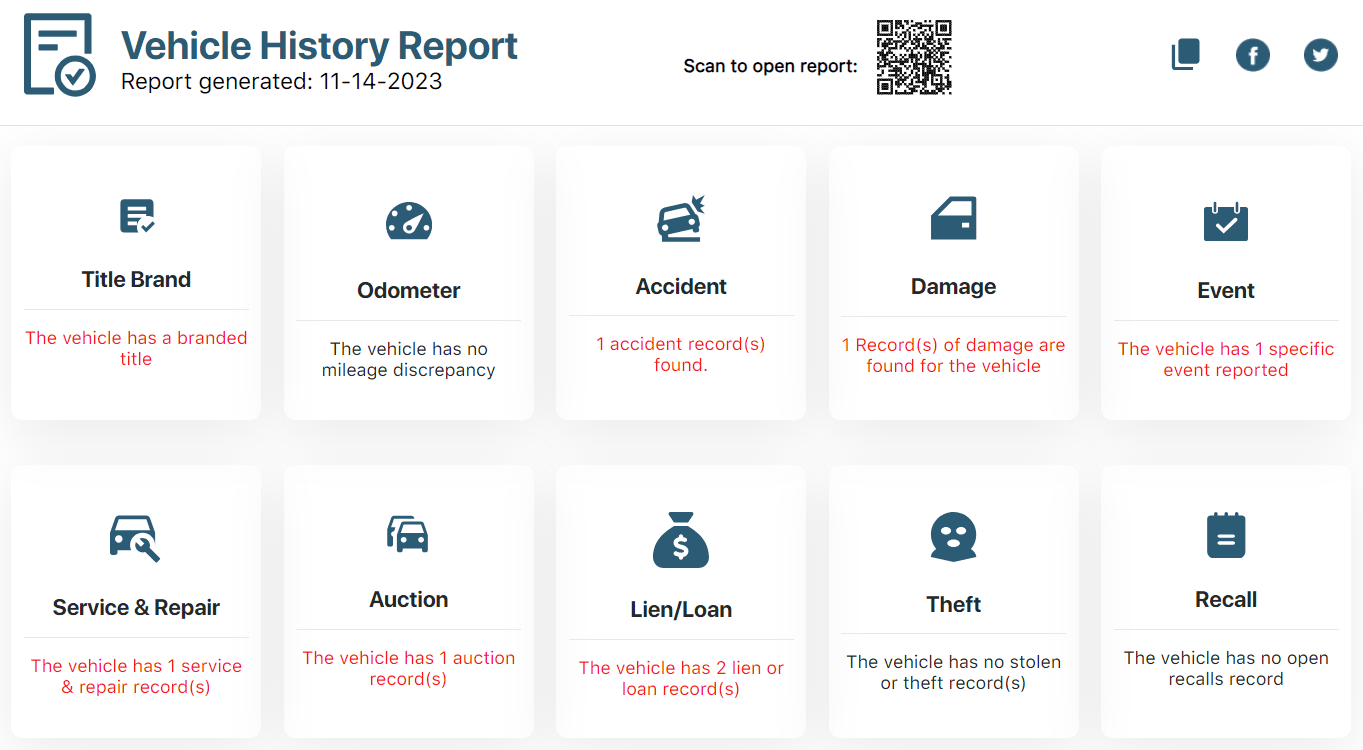
Non tutti i veicoli che si trovano sul mercato sono affidabili. Alcune di queste auto, moto o camion sono solo un disastro in attesa di accadere. I registri degli incidenti, i registri dei pegni e dei prestiti, i registri dei furti, i titoli di recupero e altro ancora potrebbero essere collegati a un veicolo che sembra bellissimo nel parcheggio. Ecco perché è importante controllare i documenti del veicolo con il VIN prima di accettare qualsiasi acquisto.
Il rapporto di storia del veicolo è un documento che riporta la storia e le registrazioni di un veicolo da quando è stato immatricolato. Con l'aiuto del VIN, questi dati possono essere recuperati facilmente e istantaneamente per rendere il processo di acquisto di un'auto usata molto più semplice. Alcuni dei dettagli che potete trovare con la nostra alternativa Carfax includono:
Storia della proprietà
Tracciare i cambiamenti di proprietà è una funzione fondamentale dei VIN. Offrendo una storia di proprietà completa, la ricerca del numero di telaio di un'auto rivela modelli di proprietà a breve o lungo termine, facendo luce sul livello di manutenzione di un veicolo nel corso del tempo.
È inoltre possibile conoscere l'ubicazione, la durata della proprietà e l'anno di acquisto. Ricordate che se un'auto ha cambiato spesso proprietario, i potenziali acquirenti potrebbero voler indagare sulle ragioni di questo avvicendamento.
Rallentamento del contachilometri
Alcuni venditori e concessionari riportano indietro le letture del contachilometri dei loro veicoli solo per far apparire l'auto più giovane e con un valore più alto. Individuare le frodi sul contachilometri è un aspetto fondamentale per ottenere un rapporto VIN.
Nel rapporto, è possibile vedere in modo chiaro e chiaro il chilometraggio effettivo del veicolo ed evitare facilmente di cadere vittima di qualsiasi forma di truffa.
È inoltre possibile conoscere l'ubicazione, la durata della proprietà e l'anno di acquisto. Ricordate che se un'auto ha cambiato spesso proprietario, i potenziali acquirenti potrebbero voler indagare sulle ragioni di questo avvicendamento.
Storia degli incidenti
Gli incidenti lasciano un segno indelebile nella storia di un veicolo e i rapporti forniscono una cronologia completa degli incidenti. Questo include dettagli sul tipo e sull'entità dei danni che un veicolo può aver subito in precedenti incidenti.
Scoprite le specifiche degli incidenti passati e il potenziale impatto sull'integrità strutturale e sulla sicurezza dell'auto.
Registri dei pegni e dei prestiti
I numeri di identificazione dei veicoli aiutano gli acquirenti a identificare eventuali vincoli o prestiti in sospeso sui veicoli, evitando complicazioni finanziarie impreviste dopo l'acquisto.
La scoperta di un prestito insoluto attraverso un controllo del VIN consente agli acquirenti di negoziare con il venditore o di scegliere opzioni alternative. Inoltre, elimina il rischio di vedersi pignorare il veicolo dopo l'acquisto.
Utilizzo del veicolo
I numeri di telaio indicano l'utilizzo di un veicolo, fornendo dettagli sul fatto che sia stato un veicolo personale, facente parte di una flotta o utilizzato per scopi commerciali. Questa informazione aiuta gli acquirenti a capire l'usura che il veicolo può aver subito.
Ad esempio, se un'auto fa parte di una flotta commerciale, potrebbe avere un chilometraggio più elevato e modalità di utilizzo diverse rispetto a un tipico veicolo personale.
Specifiche del veicolo
Con la ricerca del numero di telaio di un'auto, è possibile visualizzare le specifiche precise del veicolo in pochi clic. Controllate l'anno, la marca, il modello, l'assetto e le specifiche del motore, come le dimensioni e il tipo di motore, la trasmissione, il Paese di origine, il tipo di carburante, il tipo di trazione, il numero di porte, il peso a vuoto, l'MSRP, il tipo di carrozzeria, il tipo di veicolo, le dimensioni del veicolo e i posti a sedere standard.
Controllo del titolo
Uno dei ruoli fondamentali del numero VIN sulle auto è quello di aiutare gli acquirenti a verificare lo stato del titolo di proprietà di un veicolo. In questo modo si garantisce che il veicolo sia libero da vincoli, recuperi, titoli ricostruiti, titoli spazzatura, danni da alluvione, atti vandalici, pignoramenti o altri problemi di titolo che potrebbero complicare il processo di acquisto.
Storia dei danni
È possibile verificare la storia dei danni del veicolo controllando il VIN dell'auto. Verificate se l'auto presenta danni maggiori o minori, ammaccature, graffi, danni strutturali, danni da incendio, grandine, alluvione e altro ancora.
Assegno rubato
Nessuno vuole ritrovarsi con un veicolo rubato e il controllo del numero di telaio consente di individuarlo immediatamente. Grazie al numero di telaio delle auto, gli acquirenti possono verificare se un veicolo è stato segnalato come rubato.
Questo controllo aggiunge un ulteriore livello di sicurezza e rassicurazione per i potenziali proprietari. Conoscere lo stato di furto di un'auto aiuta gli acquirenti a evitare complicazioni legali e garantisce la massima tranquillità.
Valore di mercato
Sapete che quanto vale un veicolo? I prezzi delle auto usate variano da Stato a Stato ed è per questo che un rapporto dettagliato sulla storia del veicolo è importante. Assicura che i clienti prendano decisioni informate durante le trattative. Ottenete un'accurata e aggiornata tendenza dei prezzi del veicolo in diverse condizioni, come eccellente, buono, discreto e scadente, e i relativi prezzi di mercato, compresi i valori al dettaglio dei concessionari, dei privati e delle permute.
Storia dettagliata del veicolo è orgoglioso di fornire informazioni uniche sulle vendite e sulla storia delle aste che non sono disponibili in nessun altro posto al mondo!
Storia delle vendite
Quando si tratta del percorso di vendita di un veicolo, i numeri di telaio fungono da ottimi registri. Con questo numero è possibile controllare le inserzioni del veicolo, la data di inserimento, il valore al dettaglio, il prezzo, le letture del contachilometri, le condizioni e i dettagli essenziali sulle precedenti transazioni di vendita, offrendo ai potenziali acquirenti preziose informazioni sul passato dell'auto.
Se un'auto è passata di mano più volte in un breve lasso di tempo, il rapporto di cronologia VIN può rivelare questo schema, inducendo ulteriori indagini sulle sue condizioni e sulla sua affidabilità.
Storia dell'asta
Per i veicoli che sono stati messi all'asta, i numeri di telaio sono un modo semplice per ottenere i record dell'asta e le immagini, se disponibili.
Con il nostro strumento di ricerca del VIN dell'auto e il VIN dell'auto, è possibile visualizzare il tipo di venditore, la data dell'asta, le condizioni, i danni primari e secondari e altro ancora.
Sono inclusi i prezzi di vendita, la data dell'asta, il tipo di venditore, il luogo, il tipo di asta e qualsiasi evento degno di nota verificatosi durante le aste.

Registri di assistenza e programmi di manutenzione
I numeri di telaio delle auto offrono informazioni sulla i registri di manutenzione del veicolo nel corso degli anni e si possono trovare anche i consigli per la manutenzione per gli anni a venire.
Queste informazioni ottenute attraverso la ricerca del numero di telaio aiutano gli acquirenti a valutare la cura e le condizioni generali dell'auto.
Carfax vs. Storia dettagliata del veicolo: La migliore alternativa a Carfax
| Confronto | Storia dettagliata del veicolo | Carfax |
|---|---|---|
| Specifiche dettagliate del veicolo | ||
| Storia della proprietà | ||
| Storia degli incidenti | ||
| Controlli dei danni | ||
| Dati sul valore di mercato | ||
| Decodifica VIN offline | ||
| Supporto per i veicoli classici | ||
| Raccomandazioni per la manutenzione | ||
| Registri d'asta con foto | ||
| Inserzione di vendita con foto | ||
| Controllo del titolo con marchio | ||
| Controllo del titolo di recupero | ||
| Mappa della storia della proprietà | ||
| Richiami | ||
| Supporto per autocarri pesanti, rimorchi e motociclette | ||
| Applicazione mobile e desktop | ||
| I crediti, i report e le vetrofanie non scadono mai |
Guarda come la Storia dettagliata del veicolo si confronta con la Carfax. Leggi qui
Importanza dei numeri di telaio nell'acquisto di auto usate
Ora che sapete cosa potete ottenere da un controllo del VIN, dovete anche comprenderne i vantaggi. Per la maggior parte degli acquirenti di auto usate, la scelta giusta sul mercato dipende completamente dalla quantità di informazioni di cui si può disporre. Ecco alcuni dei vantaggi di un rapporto storico VIN:
- Riduzione del rischio: Rivelando i potenziali problemi, i VIN lookup delle auto aiutano gli acquirenti a eliminare il rischio di acquistare un veicolo problematico.
- Processo decisionale informato: Questo è uno degli aspetti più importanti della verifica del VIN: un processo decisionale informato. Quando si hanno tutte le informazioni necessarie davanti a sé, è facile distinguere i veicoli affidabili da quelli danneggiati.
- Strumento di negoziazione: I numeri di telaio aiutano gli acquirenti a valutare il reale valore di un'auto usata, fornendo dettagli sul valore di mercato e sui potenziali costi di riparazione. In questo modo gli acquirenti possono negoziare correttamente e prendere decisioni economicamente vantaggiose e in linea con il loro budget.
- Prevenzione delle frodi: Il numero di telaio delle auto è fondamentale per prevenire le frodi, in quanto rivela potenziali problemi come il rollback del contachilometri, i titoli di recupero o lo stato di furto. Queste informazioni proteggono gli acquirenti dal rischio di cadere vittime di pratiche ingannevoli.
- Valutazione del valore di rivendita: La comprensione della storia di un veicolo attraverso i rapporti consente agli acquirenti di prevedere il deprezzamento del veicolo nel tempo, influenzando le aspettative sul valore di rivendita.
- Fiducia nell'acquisto: Un acquirente che esamina un rapporto VIN pulito è più propenso a procedere con l'acquisto, sapendo che il veicolo ha una storia trasparente e affidabile. Questa fiducia è fondamentale per effettuare un acquisto in linea con le aspettative e le esigenze dell'acquirente.
- Conformità legale: Il VIN sulle auto aiuta gli acquirenti a garantire la conformità legale, verificando la presenza di problemi come titoli di recupero o vincoli in sospeso. Questa conoscenza previene potenziali complicazioni legali dopo l'acquisto.
Comprare un'auto usata? Non dimenticate di fare una Controllo del VIN
è apparso su Craigslist per $41,000apparentemente un affare. Tuttavia, uno sguardo più attento ha rivelato alcuni dettagli preoccupanti.
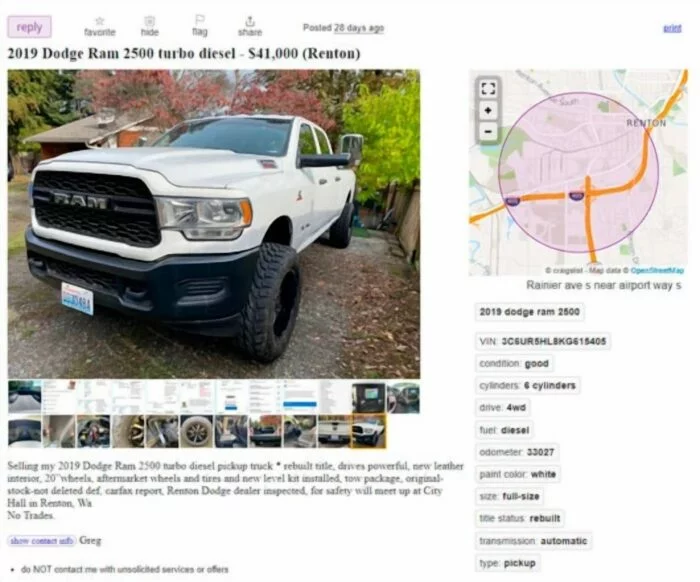
Nonostante il basso chilometraggio e gli interni puliti, il venditore ha detto che aveva un titolo ricostruito. Scavando più a fondo, è emerso che l'auto aveva due precedenti proprietari, era stata precedentemente noleggiata, aveva un incidente segnalato e discrepanze nel chilometraggio. Inoltre, aveva due documenti di pegno o prestito, un titolo di recupero e incendio e un verbale d'asta.
Questi problemi lasciavano intendere un passato travagliato, indicando che l'auto aveva avuto più di un problema e poteva non essere un saggio investimento. Questo sottolinea l'importanza di eseguire un controllo del VIN e di esaminare a fondo la storia di un veicolo prima di effettuare un acquisto.
Paesi in cui si utilizzano i numeri VIN
Questi sono i Paesi che attualmente utilizzano il sistema VIN durante la produzione dei veicoli.

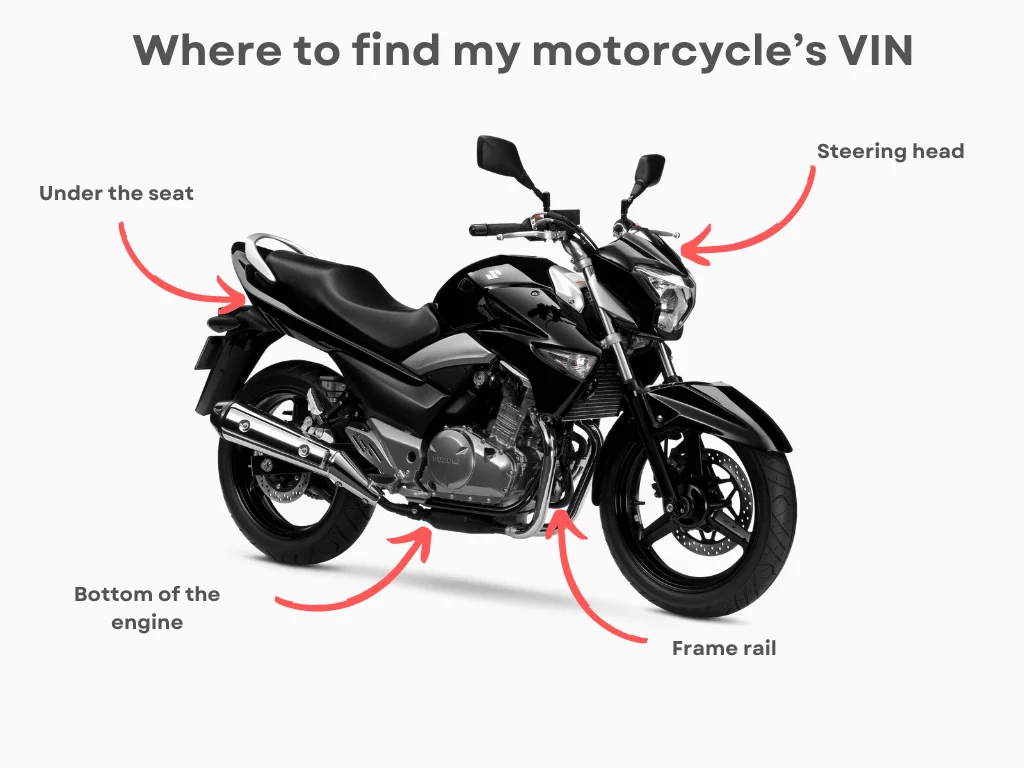
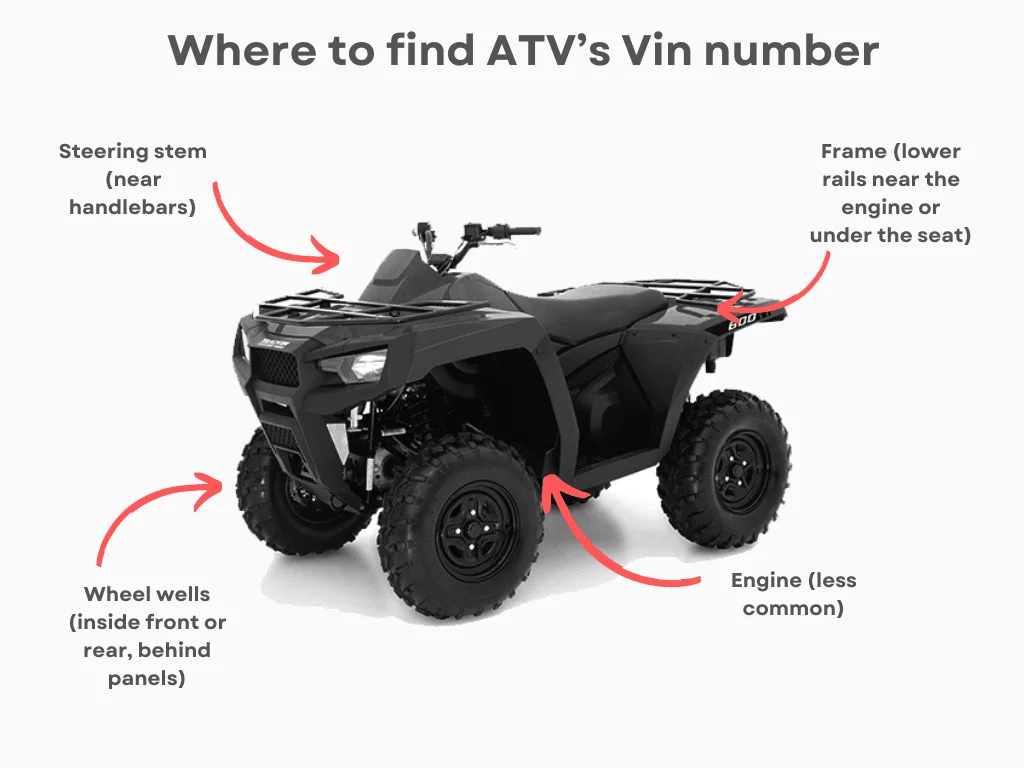
RV rimorchiabili: I camper trainabili sono costruiti da un unico costruttore, dato che non dispongono di tutti i complessi componenti di guida, come il telaio e la catena cinematica.
RV guidabili / Numeri di telaio dei camper
Numeri di telaio dei camper trainabili
I camper trainabili sono costruiti in un'unica fase e da un unico produttore, pertanto i loro VIN sono più facili da identificare e decodificare. Con il numero di telaio di un camper rimorchiabile è possibile trovare l'anno, la marca, il modello, il tipo di rimorchio, le informazioni sulla produzione e altro ancora.
Dove si può trovare il numero di telaio di un camper?
- Stipite della porta del conducente: Cercate una placca metallica o un adesivo all'interno dello stipite della portiera del conducente.
- Parabrezza: Controllare l'angolo anteriore del cruscotto del lato guida, visibile attraverso il parabrezza.
- Vano motore: Ispezionare il firewall o la staffa di supporto del radiatore.

- Etichetta di certificazione federale: Si trova nell'angolo anteriore sinistro (lato inferiore della strada) del camper, vicino alla parte inferiore della parete laterale.
- Lingua o telaio: Cercate una piastra metallica o un adesivo vicino alla linguetta (la parte che si collega al veicolo trainante) o sulla guida del telaio vicino al gancio.
- Parte inferiore del rimorchio: Controllare le barre di supporto o gli elementi del telaio sul lato inferiore.
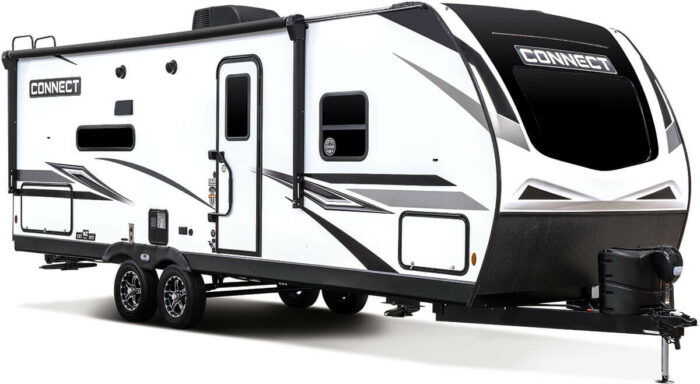
Parliamo ora di camion e semirimorchi. Dove si può trovare il numero di telaio di un camion? Scopriamolo nella prossima sezione.
Numeri di telaio per camion e semirimorchi
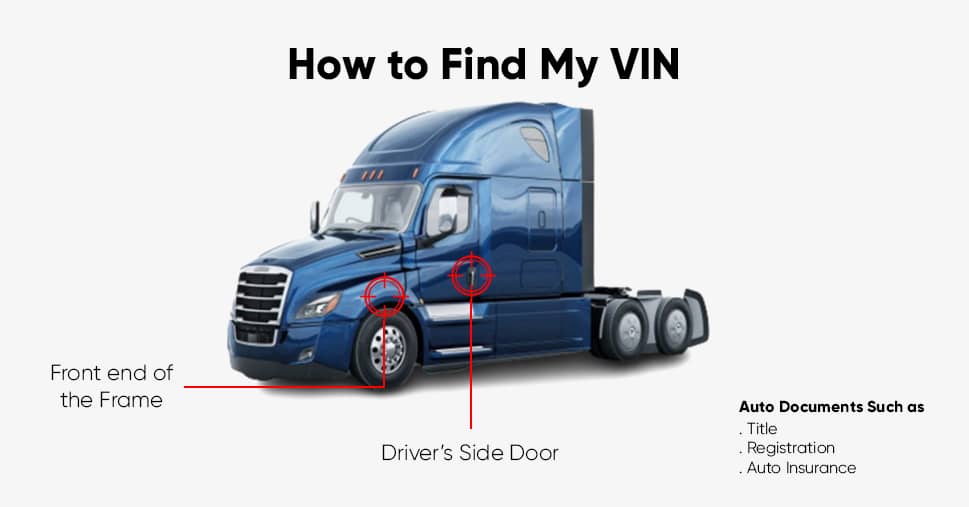
Gli autocarri e i semirimorchi sono veicoli pesanti con diverse applicazioni che vanno dal trasporto merci al trasporto specializzato. Anche questi veicoli hanno un VIN standard di 17 caratteri e possono essere decodificati per accedere alle specifiche, alle caratteristiche e alla storia del veicolo.
Ecco un elenco dei punti più comuni in cui è possibile trovare il VIN su autocarri e semirimorchi:
- Stipite della porta lato guida
- Cruscotto
- Vano motore (firewall o supporto del radiatore)
- Guida del telaio lato conducente
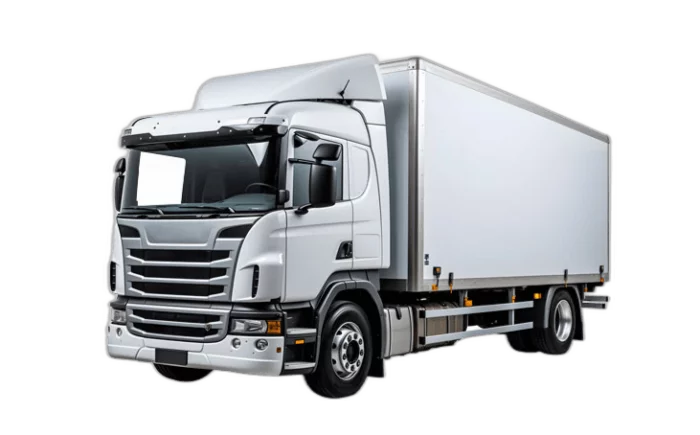
- Stipite della porta lato guida
- Montante del parabrezza
- Paraurti anteriore
- Sponda del telaio lato conducente (vicino alla cabina)
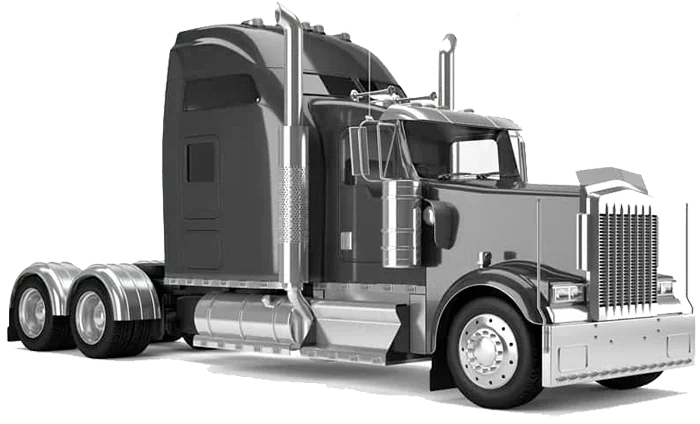
Quanti numeri di telaio ci sono su un camion?
Nella sezione precedente abbiamo discusso di come i camper siano prodotti da diversi produttori e possano necessitare di più di un numero di identificazione. Per gli autocarri e i semirimorchi questo non vale. Sui camion e sui semirimorchi è presente un solo numero VIN di 17 caratteri.
Tipi di numeri VIN
| Standard | 1 2 3 | 4 5 6 7 8 9 | 10 11 12 13 14 15 16 17 |
|---|---|---|---|
| ISO 3779 | Identificatore mondiale del produttore | Sezione descrittiva del veicolo | Sezione identificativa del veicolo |
| Unione Europea più di 500 veicoli/anno | Identificatore mondiale del produttore | Indicazione delle "caratteristiche generali del veicolo". | Indicazione che fornisce "una chiara identificazione di un particolare veicolo". |
| Unione Europea 500 o meno veicoli/anno | Identificatore mondiale del produttore | 9 | Indicazione delle "caratteristiche generali del veicolo". | Indicazione che fornisce "una chiara identificazione di un particolare veicolo". |
| Nord America più di 2.000 veicoli/anno | Identificatore mondiale del produttore | Attributi del veicolo Cifra di controllo | Modello, anno | Codice impianto | Numero sequenziale |
| Nord America più di 2.000 o meno veicoli all'anno | Identificatore mondiale del produttore |9 | Attributi del veicolo Cifra di controllo | Anno del modello | Codice impianto | Identificatore del produttore | Numero sequenziale |
Ora conoscete il tipo di VIN che potete incontrare a seconda degli standard utilizzati. Parliamo di una parte molto importante di questo documento: la decodifica del VIN!
Strumenti e risorse per la decodifica dei VIN
Quando si tratta di decodificare il numero di identificazione del veicolo, il primo decodificatore a cui pensare è la storia dettagliata del veicolo.
Decodificatore VIN della storia dettagliata del veicolo
Il decodificatore VIN di Detailed Vehicle History va oltre i dati standard offerti dalla maggior parte degli strumenti gratuiti. Mentre i decodificatori di base forniscono informazioni come la marca, il modello, l'anno e il tipo di motore dell'auto, Detailed Vehicle History va più a fondo e fornisce quanto segue:
Strumento per il controllo del VIN della storia dettagliata del veicolo
Oltre alla normale decodifica del VIN, l'opzione Controllo del VIN Lo strumento può anche controllare e verificare istantaneamente la storia di un veicolo e fornire quante più informazioni possibili. Ci assicuriamo che chiunque possa visualizzare i seguenti documenti per qualsiasi auto usata:

Con la storia e le specifiche accurate dei veicoli di qualsiasi veicolo moderno o veicolo classico nelle vostre mani, non potete aspettarvi altro che le migliori decisioni durante l'acquisto o la vendita. Tenete presente che la verifica del VIN è un servizio a pagamento.
Scopri il nostro Rapporti campione VIN qui!
Adesivi per finestre e schede di costruzione
Detailed Vehicle History fornisce anche le vetrofanie per i veicoli moderni e le schede di costruzione per VIN per quelli classici. Grazie a questi documenti, è possibile verificare le caratteristiche e i pacchetti standard e opzionali di un veicolo, l'MSRP, il risparmio di carburante, le caratteristiche di sicurezza, le valutazioni di sicurezza, le caratteristiche meccaniche, le caratteristiche interne ed esterne, i colori interni ed esterni e altro ancora.
Con schede di costruzione per VIN per le auto d'epoca, si ottengono più dati relativi al produttore e alla produzione, oltre alle caratteristiche del veicolo.
App mobile accurata: Decodificatore VIN e storia del veicolo
L'applicazione per la decodifica del VIN e la cronologia del veicolo fornisce tutti i dettagli disponibili nella versione web della Cronologia dettagliata del veicolo. Tuttavia, è più comoda da usare e dispone di una funzione di scansione. Ciò significa che è sufficiente scansionare il VIN dalla targa, dall'adesivo o da qualsiasi documento che lo contenga per ottenerne la decodifica istantanea.
Provatelo subito!
I numeri di identificazione dei veicoli si sono evoluti nel corso degli anni, passando dai VIN classici a quelli moderni, ma hanno sempre lo stesso scopo. Sono identificativi utilizzati su tutti i veicoli fabbricati, compresi camper, motociclette, ATV, camion, rimorchi, semirimorchi e altro ancora.
Se siete sul mercato per uno di questi veicoli, è consigliabile utilizzare il VIN per ottenere ogni singolo dettaglio del veicolo. Non dimenticate che Detailed Vehicle History non solo fornisce gratuitamente le specifiche del veicolo (decodifica gratuita del VIN), ma assicura che ogni singolo dettaglio o record del passato sia chiaramente mostrato per una migliore identificazione dei veicoli affidabili.
Non commettete errori oggi e non ritrovatevi con i veicoli danneggiati. Decodificate subito il VIN!
Cerca il tuo VIN
Domande frequenti
Posso decodificare un numero VIN gratuitamente?
Che aspetto ha il numero di telaio di un'auto?
Il numero di identificazione del veicolo (VIN) è un codice alfanumerico univoco che si trova solitamente sul cruscotto del lato guida, vicino al parabrezza o sul telaio della portiera del lato guida. Un esempio di numero VIN è JHMES966X4S012004, composto da 17 caratteri, che possono includere sia lettere che numeri. La disposizione di questi caratteri può variare e trasmettono informazioni essenziali sul veicolo.
Cosa può dirci il numero di telaio di un veicolo?
Di quante cifre è composto un numero VIN?
Qual è la differenza tra un numero VIN e un numero di targa?
Il VIN (Vehicle Identification Number) è un codice unico specifico per ogni veicolo, che fornisce dettagli su marca, modello e origine. Il numero di targa, invece, è utilizzato principalmente per l'immatricolazione del veicolo e non è completo come il VIN. Ora sapete cosa significa VIN.
Qual è la differenza tra un numero VIN e un numero di serie?
Il numero di telaio può indicarmi il colore di un'auto?
Sì, il numero di telaio può includere informazioni sul colore esterno e interno di un veicolo, fornendo dettagli sulla vernice originale.
Come deve essere il numero di telaio di una moto?
Il numero di telaio di una moto segue in genere lo stesso formato di 17 caratteri del numero di telaio di un'automobile, fornendo informazioni su marca, modello, specifiche del motore e storia specifica delle moto.
Dove posso trovare il numero di telaio della mia auto?
Il numero di telaio dell'auto si trova comunemente sul veicolo, sul cruscotto del lato del conducente. Il modo più semplice per vederlo è stare all'esterno del veicolo sul lato del conducente e guardare l'angolo del cruscotto dove incontra il parabrezza. Si può anche controllare il telaio della portiera del lato del conducente o i documenti di immatricolazione del veicolo scritti in lettere maiuscole.
Posso cercare le dimensioni del motore in base al numero VIN?
Sì, è possibile cercare le dimensioni del motore in base al numero VIN! Utilizzando il servizio gratuito di decodifica del VIN di Detailed Vehicle History, è possibile recuperare informazioni sulle dimensioni del motore del veicolo e su altre specifiche del motore utilizzando il codice identificativo unico.
Cosa fa un decodificatore VIN?
Un decodificatore VIN interpreta i caratteri alfanumerici di un VIN, fornendo un rapporto dettagliato su marca, modello, dettagli di produzione e altre specifiche di un veicolo.
